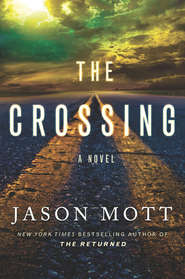По всем вопросам обращайтесь на: info@litportal.ru
(©) 2003-2024.
✖
The Returned
Автор
Год написания книги
2018
Настройки чтения
Размер шрифта
Высота строк
Поля
“You sound like a New Yorker,” Harold said.
“Is that good or bad?” Agent Bellamy asked, pretending he had not been asked about his accent a dozen times since being assigned to the Returned of southern North Carolina.
“It’s horrible,” Harold said. “But I’m a forgiving man.”
“Jacob,” Lucille interrupted. “Call him Jacob, please. His name is Jacob.”
“Yes, ma’am,” Agent Bellamy said. “I’m sorry. I should know better by now.”
“Thank you, Martin Bellamy,” Lucille said. Again, somehow, her hands were fists in her lap. She breathed deeply and, with concentration, unfolded them. “Thank you, Martin Bellamy,” she said again.
“When did Jacob leave?” Agent Bellamy asked again softly.
“August 15, 1966,” Harold said. He moved into the doorway, looking unsettled. He licked his lips. His hands took turns moving from the pockets of his worn, old pants up to his worn, old lips, finding no peace—or cigarette—on either side of the journey.
Agent Bellamy made notes.
“How did it happen?”
* * *
The word Jacob became an incantation that day as the searchers looked for the boy. At regular intervals the call went up. “Jacob! Jacob Hargrave!” And then another voice lifted the name and passed it down the line. “Jacob! Jacob!”
In the beginning their voices trampled upon one another in a cacophony of fear and desperation. But then the boy was not quickly found and, to save their throats, the men and women of the search party took turns shouting out as the sun turned gold and dripped down the horizon and was swallowed first by the tall trees and then by the low brush.
Then they were all trudging drunkenly—exhausted from high-stepping through the dense bramble, wrung out from worry. Fred Green was there with Harold. “We’ll find him,” Fred said again and again. “Did you see that look in his eyes when he unwrapped that BB gun I gave him? You ever seen a boy so excited?” Fred huffed, his legs burning from fatigue. “We’ll find him.” He nodded. “We’ll find him.”
Then it was full-on night and the bushy, pine-laden landscape of Arcadia sparkled with the glow of flashlights.
When they neared the river Harold was glad he’d talked Lucille into staying back at the house—“He might come back,” he had said, “and he’ll want his mama”—because he knew, by whatever means such things are known, that he would find his son in the river.
Harold sloshed knee-deep in the shallows—slowly, taking a step, calling the boy’s name, pausing to listen out in case he should be somewhere nearby, calling back, taking another step, calling the boy’s name again, and on and on.
When he finally came upon the body, the moonlight and the water had shone the boy to a haunting and beautiful silver, the same color as the glimmering water.
“Dear God,” Harold said. And that was the last time he would ever say it.
* * *
Harold told the story, hearing suddenly all the years in his voice. He sounded like an old man, hardened and rough. Now and again as he spoke, he would reach a thick, wrinkled hand to run over the few thin, gray strands still clinging to his scalp. His hands were decorated with liver spots and his knuckles were swollen from the arthritis that sometimes bothered him. It didn’t bother him as badly as it did some other people his age, but it did just enough to remind him of the wealth of youth that was not his anymore. Even as he spoke, his lower back jolted with a small twinge of pain.
Hardly any hair. Mottled skin. His large, round head. His wrinkled, wide ears. Clothes that seemed to swallow him up no matter how hard Lucille tried to find something that fit him better. No doubt about it: he was an old man now.
Something about having Jacob back—still young and vibrant—made Harold Hargrave realize his age.
Lucille, just as old and gray as her husband, only looked away as he spoke, only watched her eight-year-old son sit at the kitchen table eating a slice of pecan pie as if, just now, it were 1966 again and nothing was wrong and nothing would ever be wrong again. Sometimes she would clear a silver strand of hair from her face, but if she caught sight of her thin, liver-spotted hands, they did not seem to bother her.
They were a pair of thin, wiry birds, Harold and Lucille. She outgrew him in these later years. Or, rather, he shrank faster than she so that, now, he had to look up at her when they argued. And Lucille also had the benefit of not wasting away quite as much as he had—something she blamed upon his years of cigarette smoking. Her dresses still fit her. Her thin, long arms were nimble and articulate where his, hidden beneath the puffiness of shirts that fit him too loosely, made him look a bit more vulnerable than he used to. Which was giving her an edge these days.
Lucille took pride in that, and did not feel quite so guilty about it, even though she sometimes thought she should.
Agent Bellamy wrote until his hand cramped and then he wrote more. He’d had the forethought to record the interview, but he still found it good policy to write things down, as well. People seemed offended if they met with a government man and nothing was written down. This worked for Agent Bellamy. His brain was the type that preferred to see things rather than hear them. If he didn’t write it all down now he’d just be stuck doing it later.
Bellamy wrote from the time the birthday party began that day in 1966. He wrote through the recounting of Lucille’s weeping and guilt—she’d been the last one to see Jacob alive; she only remembered a brief image of one of his pale arms as he darted around a corner, chasing one of the other children. Bellamy wrote that there were almost more people at the funeral than the church could hold.
But there were parts of the interview that he did not write. Details that, out of respect, he committed only to memory rather than to bureaucratic documentation.
Harold and Lucille had survived the boy’s death, but only just. The next fifty-odd years became infected with a peculiar type of loneliness, a tactless loneliness that showed up unbidden and began inappropriate conversations over Sunday dinner. It was a loneliness they never named and seldom talked about. They only shuffled around it with their breaths held, day in and day out, as if it were an atom smasher—reduced in scale but not in complexity or splendor—suddenly shown up in the center of the living room and dead set on affirming all the most ominous and far-fetched speculations of the harsh way the universe genuinely worked.
In its own way, that was a truth of sorts.
Over the years they not only became accustomed to hiding from their loneliness, they became skilled at it. It was a game, almost: don’t talk about the Strawberry Festival, because he had loved it; don’t stare too long at buildings you admire because they will remind you of the time you said he would grow into an architect one day; ignore the children in whose face you see him.
When Jacob’s birthday came around each year they would spend the day being somber and having difficulty making conversation. Lucille might take to weeping with no explanation, or Harold might smoke a little more that day than he had the day before.
But that was only in the beginning. Only in those first, sad years.
They grew older.
Doors closed.
Harold and Lucille had become so far removed from the tragedy of Jacob’s death that when the boy reappeared at their front door—smiling, still perfectly assembled and unaged, still their blessed son, still only eight years old—all of it was so far away that Harold had forgotten the boy’s name.
* * *
Then Harold and Lucille were done talking and there was silence. But despite its solemnity, it was short-lived. Because there was the sound of Jacob sitting at the kitchen table raking his fork across his plate, gulping down his lemonade and burping with great satisfaction. “Excuse me,” the boy yelled to his parents.
Lucille smiled.
“Forgive me for asking this,” Agent Bellamy began. “And please, don’t take this as any type of accusation. It’s simply something we have to ask in order to better understand these...unique circumstances.”
“Here it comes,” Harold said. His hands had finally stopped foraging for phantom cigarettes and settled into his pockets. Lucille waved her hand dismissively.
“What were things like between you and Jacob before?” Agent Bellamy asked.
Harold snorted. His body finally decided his right leg would better hold his weight than his left. He looked at Lucille. “This is the part where we’re supposed to say we drove him off or something. Like they do on TV. We’re supposed to say that we’d had a fight with him, denied him supper, or some kind of abuse like you see on TV. Something like that.” Harold walked over to a small table that stood in the hallway facing the front door. In the top drawer was a fresh pack of cigarettes.
Before he’d even made his way back to the living room Lucille opened fire. “You will not!”
Harold opened the wrapper with mechanical precision, as if his hands were not his own. He placed a cigarette, unlit, between his lips and scratched his wrinkled face and exhaled, long and slow. “That’s all I needed,” he said. “That’s all.”
Agent Bellamy spoke softly. “I’m not trying to say that you or anyone else caused your son’s...well, I’m running out of euphemisms.” He smiled. “I’m only asking. The Bureau is trying hard to make heads or tails of this, just like everyone else. We might be in charge of helping to connect people up with one another, but that doesn’t mean we have any inside knowledge into how any of this is working. Or why it’s happening.” He shrugged his shoulders. “The big questions are still big, still untouchable. But our hope is that by finding out everything we can, by asking the questions that everyone might not necessarily be comfortable answering, we can touch some of these big questions. Get a handle on them, before they get out of hand.”
Lucille leaned forward on the old couch. “And how might they get out of hand? Are things getting out of hand?”
“They will,” Harold said. “Bet your Bible on that.”
Agent Bellamy only shook his head in an even, professional manner and returned to his original question. “What were things like between you and Jacob before he left?”







